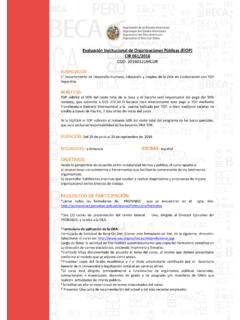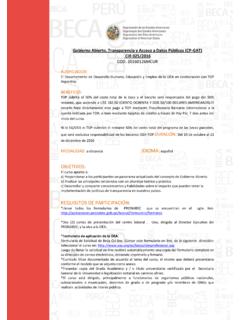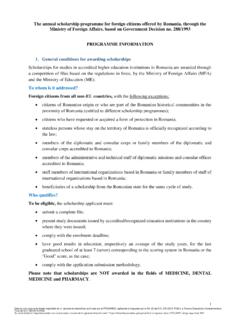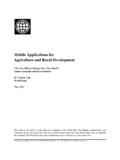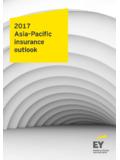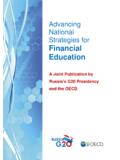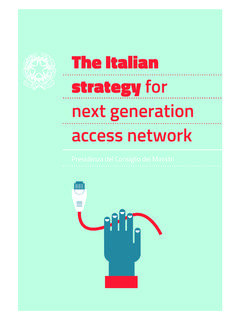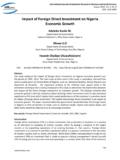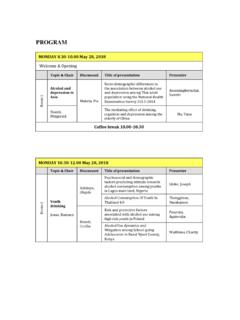Transcription of KOICA–SSU Master’s Degree Program in Global ICT ...
1 KOICA SSU Master s Degree Program in Global ICT convergence with management and public Policy August 15, 2016 December 20, 2017 Seoul, Korea Program Information Korea International Cooperation Agency Graduate School of Information Sciences Soongsil University PART II. Program OVERVIEW CONTENTS PART I. KOICA & SCHOLARSHIP Program 03 PART II. Program OVERVIEW PART 08 PART III. HOW TO APPLY 10 1. APPLICATION ELIGIBILITY 10 2. ADMISSION PROCESS 12 3. REQUIRED DOCUMENTS 15 PART IV. Program CONTENTS 19 1. ACADEMIC SCHEDULE 19 2. ORIENTATION 20 3. CURRICULUM 21 4. EXTRA CURRICULAR ACTIVITIES 24 PART V. TRAINING INSTITUTE 26 1. GENERAL INFORMATION 26 2. ACCOMMODATION 27 3. OTHER INFORMATION FOR INTERNATIONAL STUDENTS 30 PART VI. SUPPORT SERVICE 48 1. TRAVEL TO KOREA 48 2. EXPENSES FOR STUDY AND LIVING 48 3. INSURANCE 49 PART VII. REGULATIONS 51 1. ACADEMIC REGULATION 51 2. PARTICIPANT'S RESPONSIBILITIES 53 3.
2 WITHDRAWALS 54 4. TEMPORARY LEAVE 54 5. ACCOMPANYING OR INVITING FAMILY 55 6. OTHERS 55 PART VIII. CONTACTS 56 APPENDIX . Fellows Facebook & Twitter 58 PART I. KOICA & SCHOLARSHIP Program 3 Part I KOICA & SCHOLARSHIP Program The Korea International Cooperation Agency was founded as a government agency on April 1, 1991, to maximize the effectiveness of Korea s grant aid programs for developing countries by implementing the government s grant aid and technical cooperation programs. In the past, development cooperation efforts were focused on meeting the Basic Human Needs (BHNs) of developing countries and on fostering their Human Resources Development (HRD). However, such focus has now shifted to promoting sustainable development, strengthening partnerships with developing partners, and enhancing the local ownership of beneficiaries. Additionally, Global concerns such as the environment, poverty reduction, gender mainstreaming, and population have gained significant importance among donor countries.
3 Due to the continuously changing trends in development assistance efforts and practices, KOICA is striving to adapt to these changes by using its limited financial resources effectively on areas where Korea has a comparative advantage. In particular, since Korea has the unique experience of developing from one of the poorest countries in the world to one of the most economically advanced, this knowhow is an invaluable asset that can help KOICA to efficiently support the sustainable socio-economic development of its partner countries. PART I. KOICA & SCHOLARSHIP Program 4 Korea s ODA Framework Official Development Assistance (ODA) is composed of grants or concessional loans, which are provided to developing countries with the purpose of promoting economic development and welfare. Korea s ODA is classified into three areas: 1) bilateral aid (grant aid & technical cooperation), 2) bilateral loans, and 3) financial subscriptions and contributions to international organizations (multilateral).
4 Bilateral aid is comprised of technical cooperation and various types of transfer (made in cash, goods or services) with no obligation for repayment, and is implemented by KOICA under the authority of the Ministry of Foreign Affairs in the Republic of Korea. Bilateral loans are provided on concessional terms under the name of the Economic Development Cooperation Fund (EDCF), implemented by the Export-Import Bank of Korea under the Ministry of Strategy and Finance. Multilateral assistance is delivered either as financial subscriptions or contributions to international organizations. PART I. KOICA & SCHOLARSHIP Program 5 Korea's Experience and KOICA's Program for Human Resources Development Human Resource Development (HRD) has been the most important factor in Korea's escape from the vicious cycle of poverty and underdevelopment that had existed for many decades.
5 with scant natural resources, HRD played a vital role in modern Korea's development. Clearly, Korea has emerged as an exemplary showcase of national development powered by human resources development. From its own development experience, Korea came to fully recognize the significance of HRD, specifically in regards to Korea's collaboration with other developing countries. with much experience and know-how in HRD, Korea can greatly contribute to the international community by sharing its unique development experience with other nations. Since its establishment in 1991, KOICA has supported a variety of international cooperation programs for HRD, mainly in project-type aid form focused on education and vocational training with the aim of building a foundation for HRD. The training Program provides opportunities to individuals from developing countries to gain first-hand knowledge of Korea s development experience.
6 The purpose of the Program is to enable the participants to apply what they learned for the development of their home country or local community. Since 1991, KOICA has an accumulated sum of 58,916 participants who have enrolled in the Program , and each year we invite approximately 5,000 participants under some 300 different courses. There are a wide range of topics covered in the training Program , including administration, economic development, science and technology, information and communication technology, agriculture and health. In order to meet the changing needs of partner countries, KOICA always strives to renovate and improve its HRD programs. PART I. KOICA & SCHOLARSHIP Program 6 Types of KOICA Training Programs KOICA offers five major types of training programs: 1. Country Training Program Tailored programs that are specifically designed for an individual partner country 2.
7 Regular Training Program Programs that are open to any interested partner countries 3. Special Training Program Programs that are temporarily available owing to particular commitments of the Korean as well as partner governments 4. Joint Training Program Programs conducted in partnership with international organizations and other agencies 5. Scholarship Program Master s Degree programs offered to individuals from partner countries PART I. KOICA & SCHOLARSHIP Program 7 KOICA's Scholarship Program with a mission to nurture talented students from developing countries, KOICA invites high-caliber students from developing countries and helps them gain professional and systematic knowledge that will play a key role in their home country s development. To accomplish this mission, KOICA has been operating master s Degree courses with leading Korean universities in the fields of economics, trade, women s empowerment, rural development, etc.
8 In particular, this Program has significantly strengthened the relationships between Korea and the students home countries. Students, who have been given an opportunity to see Korea s experience in poverty reduction and socio-economic development, will gain a deeper understanding of Korea and contribute to the future social, political and economic ties between the two nations. From 1997 to 2015, the Program has assisted a total of 2,598 students through 141 courses. And as of 2015, 388 participants will participate in 19 master s Degree programs at 19 Korean universities. KOICA Scholarship Program is fully committed to the Millennium Development Goals (MDGs) and is determined to expand its efforts to nurture future talents from developing countries to promote their countries sustainable economic growth and social II. Program OVERVIEW 8 Part II Program OVERVIEW Program Title: KOICA SSU Master s Degree Program in Global ICT convergence with management and public Policy (Hereafter, we call it KOSMIC: KOICA SSU Master s Degree Program in Global ICT convergence ) Name of the Degree : Master of Engineering Duration: -Stay duration in Korea : August 15th, 2016 December 20th, 2017 (16 Months) -Academic duration : August 18th, 2016 February, 2018 Objectives - a.
9 To educate governmental officials of the participating developing countries in the areas of ICT policy in order to enhance the capacity for the implementation through KOICA SSU Master s Degree Program in Global ICT convergence with management and public Policy from a practical viewpoint as well as academic training. - b. To suggest the strategies and tactics for the ICT master plan after introducing well-known Korean ICT development cases that are considered as a model for developing countries to speed up the successful ICT implementation within a short period. - c. To review the strategies to set up the stepwise ICT (Information and Communications Technology) master plan for the participating developing countries based on the specific living environment and the social requirements while considering many application areas from a variety of case studies.
10 PART II. Program OVERVIEW 9 - d. To share the Korean experience in ICT implementation and its application tools in order to ultimately promote the participants as a key ICT policy makers in their home countries. - e. To increase the human network capability and communication skills, administrative capacity, and management capability for Global ICT leaders from participating developing countries based on the convergence among ICT, public administration and business administration fields. Training Institute - Graduate School of Information Sciences, Soongsil University ( ) Cooperation with Related Educational Organizations a. Department of IT, Policy and management in Graduate School of Soongsil University. Many Korean governmental officials who possess the higher rank than the deputy director are studying IT, Policy and management for Master s and degrees b.
